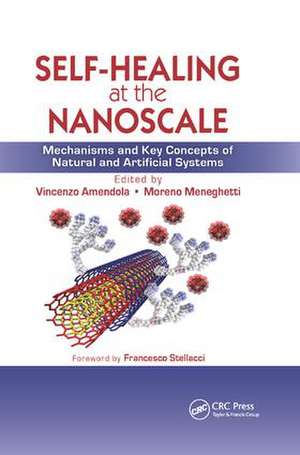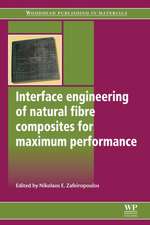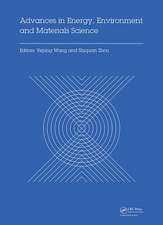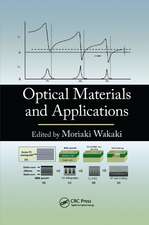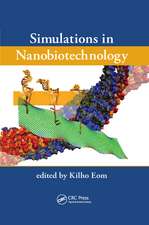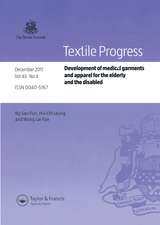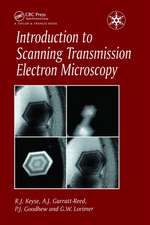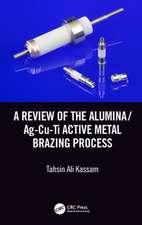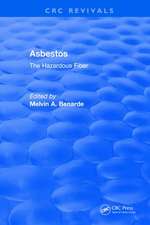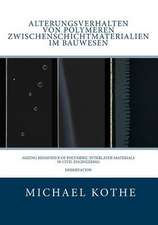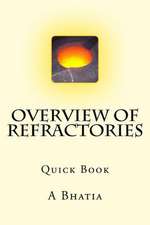Self-Healing at the Nanoscale: Mechanisms and Key Concepts of Natural and Artificial Systems
Editat de Vincenzo Amendola, Moreno Meneghettien Limba Engleză Paperback – 21 noi 2018
- Natural Self-Healing Systems covers paradigmatic self-repair systems developed by nature in living organisms
- Artificial Self-Healing Systems describes various materials whose structures have been engineered at the micro- or nanoscale to obtain self-repair ability
- Frontiers of Self-Healing Systems includes contributions on systems studied in recent years that have shown potential for developing or inspiring new self-healing nanomaterials
Preț: 352.95 lei
Preț vechi: 469.68 lei
-25% Nou
Puncte Express: 529
Preț estimativ în valută:
67.55€ • 72.92$ • 56.64£
67.55€ • 72.92$ • 56.64£
Carte tipărită la comandă
Livrare economică 19 aprilie-03 mai
Preluare comenzi: 021 569.72.76
Specificații
ISBN-13: 9781138374478
ISBN-10: 1138374474
Pagini: 463
Ilustrații: 196
Dimensiuni: 156 x 234 mm
Greutate: 0.45 kg
Ediția:1
Editura: CRC Press
Colecția CRC Press
ISBN-10: 1138374474
Pagini: 463
Ilustrații: 196
Dimensiuni: 156 x 234 mm
Greutate: 0.45 kg
Ediția:1
Editura: CRC Press
Colecția CRC Press
Cuprins
Natural Self-Healing Systems. Artificial Self-Healing Systems. Frontiers of Self-Healing at the Nanoscale.
Notă biografică
Vincenzo Amendola has been an assistant professor of physical chemistry in the Department of Chemical Sciences of Padua University since 2008. He received his Ph.D. in material science and engineering in 2007 and his master’s degree in material science in 2004, both from Padua University, working in the group of Professor M. Meneghetti. In 2007, he was a 6 month visiting PhD student at Massachusetts Institute of Technology, as part of the group of Professor F. Stellacci, and in 2011 he was a 7 month academic visitor at Cambridge University, as part of the group of Dr. A.C. Ferrari. He was honored with the Levi prize and the Semerano prize from the Italian Chemical Society. He is the author of several peer-reviewed papers, one patent, and has given invited talks at several conferences, including the first conference about Laser Irradiation and Nanoparticles Generation in Liquids (ANGEL2010). He also serves as referee for several journals about nanotechnology, plasmonics and physical chemistry. His main research topics are the laser ablation synthesis in solution (LASiS) of functional and functionalizable nanostructures, the study of plasmonic properties of nanoparticles, and, in general, the interaction of nanosecond laser pulses with matter for the generation of new materials and of new phenomena (like self-healing processes). He is currently collaborating with various research groups in Europe and Asia. More information about his research activities can be found on the web at www.chimica.unipd.it/vincenzo.amendola.
Moreno Meneghetti is a full professor of physical chemistry at the University of Padova. He focuses his research interests on the optical properties of materials as tools for understanding their behavior. He uses both experimental and theoretical approaches for characterizing phase transitions in conducting and superconducting organic materials, focusing especially on electron-phonon couplings involving molecular units. He developed full-diagonalization and non-mean field approaches to study the optical properties (vibrational and electronic) of low-dimensional solids. Dr. Meneghetti’s research interests also include nonlinear optical properties of molecular systems and particularly the dynamics of nonlinear transmission of excited states with applications like optical limiting. Nonlinear optical properties and Raman properties of nanostructures based on carbon-like fullerenes and nanotubes were also investigated for their reactivity and for the preparation of new materials. Models for the electronic properties of single-wall nanotubes based on non-conventional methodologies are also the focus of his current research. Laser ablation of metals in solution for the production of metal nanoparticles is another aim of his research, focusing especially on the SERS effect. In particular, gold nanoparticles are used as nanobioconjugates with applications in nanomedicine for targeting and imaging at the sub-cell level. Dr. Meneghetti’s research activity has been published in more than 130 papers in peer-reviewed journals.
Moreno Meneghetti is a full professor of physical chemistry at the University of Padova. He focuses his research interests on the optical properties of materials as tools for understanding their behavior. He uses both experimental and theoretical approaches for characterizing phase transitions in conducting and superconducting organic materials, focusing especially on electron-phonon couplings involving molecular units. He developed full-diagonalization and non-mean field approaches to study the optical properties (vibrational and electronic) of low-dimensional solids. Dr. Meneghetti’s research interests also include nonlinear optical properties of molecular systems and particularly the dynamics of nonlinear transmission of excited states with applications like optical limiting. Nonlinear optical properties and Raman properties of nanostructures based on carbon-like fullerenes and nanotubes were also investigated for their reactivity and for the preparation of new materials. Models for the electronic properties of single-wall nanotubes based on non-conventional methodologies are also the focus of his current research. Laser ablation of metals in solution for the production of metal nanoparticles is another aim of his research, focusing especially on the SERS effect. In particular, gold nanoparticles are used as nanobioconjugates with applications in nanomedicine for targeting and imaging at the sub-cell level. Dr. Meneghetti’s research activity has been published in more than 130 papers in peer-reviewed journals.
Descriere
Self-healing materials can repair damage caused by their activity, similar to how biological systems heal themselves after being wounded. This book presents a general strategy and key concepts of self-healing systems, repairing mechanisms at the nanoscale, and the role of nanostructures in these systems. The text covers natural and artificial systems, including nanostructured and macroscopic systems. It also reviews a series of systems that show potential for building self-healing devices.
